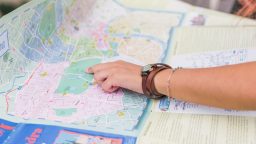Traveling the world is one of the most enriching experiences, but it can often feel like a financial strain, especially if you’re on a tight budget. The good news is, with a little planning and some savvy strategies, you can explore new destinations without breaking the bank. Whether you’re a backpacker, a family on vacation, or a luxury traveller looking to save, these money-saving tips will help you get the most out of your travel adventures without overspending.
- Plan Your Trip in Advance
One of the most effective ways to save money while travelling is to plan ahead. By booking flights and accommodation well in advance, you can take advantage of early-bird deals and discounts. Flights, in particular, tend to rise in price as the departure date gets closer, so booking several months in advance can help you secure the best rates.
Accommodation is another area where early planning can save you money. Many hotels and hostels offer discounted rates for early bookings, and websites like Booking.com or Airbnb often have flash sales and special offers. If you’re travelling to a popular destination, securing accommodation in advance is even more crucial as last-minute options can be costly.
- Use Fare Comparison Websites
Flight prices can vary significantly between different airlines and booking platforms, which is why it’s essential to compare fares before booking. Fare comparison websites like Skyscanner, Google Flights, and Momondo help you find the best deals by comparing prices across multiple airlines and travel agencies. These platforms often include filters that let you adjust departure times, layovers, and other factors to find cheaper options.
Moreover, try booking flights during times when they are less likely to be in demand, such as mid-week flights or those during off-peak seasons. Flights on Tuesdays and Wednesdays are typically cheaper, and travelling outside of holidays can also help you save.
- Travel During Off-Peak Seasons
Travelling during off-peak seasons is one of the easiest ways to cut down on travel expenses. Many popular tourist destinations have peak seasons when prices are at their highest. These can often be during the summer months or around holidays. However, travelling in the shoulder or off-season—when there are fewer tourists—can save you a lot of money on flights, hotels, and attractions.
Not only do you get to avoid the crowds, but you’ll also find that accommodations are more affordable, and you can take advantage of special promotions and deals. The off-season varies depending on the destination, so make sure to research the best times to visit each location.
- Opt for Public Transportation
While taxis and ride-hailing services like Uber might be convenient, they can quickly add up during your travels. Instead, opt for public transportation, which is often much more affordable. Most cities around the world offer efficient public transportation systems, including buses, trains, and metros that can get you around for a fraction of the price of a taxi.
In some destinations, you can also rent a bicycle or use a scooter-sharing service, which can be both fun and cost-effective. Many cities also offer travel passes that give you unlimited rides for a set period, allowing you to explore more affordably.
- Cook Your Own Meals
Eating out every day can become one of the largest expenses while travelling. While it’s tempting to try local restaurants and street food, cooking your own meals can help you save a significant amount of money. If you’re staying in an apartment, hostel, or guesthouse with kitchen facilities, take advantage of this by shopping at local markets and preparing your own meals.
Even if you’re staying in a hotel, consider grabbing breakfast and snacks at a nearby supermarket or convenience store. Many destinations offer fresh produce and affordable ingredients that can be used to create simple yet delicious meals.
- Look for Free Attractions
Many cities offer a range of free attractions, from museums and parks to walking tours and festivals. Research your destination before you travel to identify the best free or low-cost things to do. Many museums offer free entry on certain days of the month, and some cities have walking tours that operate on a tip-based system, meaning you pay what you can afford.
National parks, hiking trails, and public beaches are often free to access and provide incredible opportunities to explore nature without spending a penny. Take advantage of free events, festivals, and outdoor concerts that often take place in major cities as well.
- Travel with a Group
If you’re planning a big trip, consider travelling with a group to split the costs. Whether it’s for accommodation, transportation, or food, sharing expenses with others can make a significant difference in your travel budget. Many destinations, especially those in Europe or Southeast Asia, offer group discounts for tours, activities, and transportation services.
If you’re not travelling with friends or family, consider joining group tours or finding travel buddies through online platforms or social media. You may find others who are looking to share the costs of accommodation or rent a car, which can make your trip much more affordable.
- Use Cashback and Rewards Programs
Make use of cashback and rewards programs to save money on travel-related expenses. Many credit cards offer travel rewards, allowing you to accumulate points for every purchase you make. These points can be redeemed for flights, hotels, car rentals, or even cashback.
Additionally, booking websites and airlines often have loyalty programs where you can earn points that translate into discounts or free services. Signing up for these programs can result in great savings on future trips, and in some cases, you may receive complimentary upgrades or perks like priority boarding or free checked baggage.
- Stay in Alternative Accommodation
Luxury hotels aren’t the only option for accommodation. Consider alternative lodging like hostels, guesthouses, or even staying with locals via platforms like Couchsurfing or Airbnb. These options often provide a more affordable alternative while still offering comfort and a more personal experience.
If you’re feeling adventurous, camping or renting a camper van can also be a great way to save money on accommodation, while enjoying a more immersive travel experience in nature.
- Be Mindful of Your Spending
Finally, one of the most effective ways to save money while travelling is to be mindful of your daily spending habits. It’s easy to get caught up in the excitement of being in a new place, but small expenses can quickly add up. Keep track of your spending, set a daily budget, and look for opportunities to save on little things—whether it’s skipping that second coffee or walking instead of taking a taxi.
By being conscious of your finances, you’ll have more room to spend on experiences that truly matter, such as visiting a top attraction or enjoying a special meal.
Conclusion
Saving money while travelling doesn’t mean sacrificing the quality of your experience. With the right strategies—like planning ahead, using public transport, and embracing local cuisine—you can have a fulfilling and memorable trip without blowing your budget. By staying mindful of your spending and seeking out deals, you’ll be able to enjoy the sights and sounds of the world without worrying about finances. So go ahead, start planning your next adventure with confidence—it’s possible to travel well and still save big!





